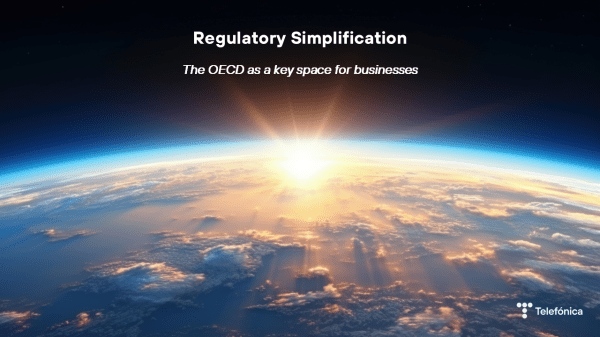Europe’s new industrial strategy develops a number of proposals to meet the twin challenges of the green and digital transition, while strengthening the competitiveness of the region’s industry. But how can these solutions be implemented in practice? The European Internet Forum brings together representatives from the European institutions and the private sector to provide a cross-sectoral perspective in this area. Christoph Steck, Director of Public Policy and Internet at Telefónica, explains the most relevant challenges and proposals for achieving European digital leadership based on values.
Technology has become the playground of geopolitics
The exponential acceleration of digital transformation and the massive adoption of digital services has highlighted the opportunity and importance of the European strategy of “shaping Europe’s digital future”. The emergency situation generated by Covid-19 has introduced a sense of urgency to modernise policy and regulation in haste.
We are at a turning point. In the short term, we are facing an economic crisis accompanied by major negative effects on the European industrial fabric, which will only deepen existing social, economic and territorial inequalities. Given this reality, we need to broaden the scope and focus on value-based European technological leadership.
“There is a feeling in Europe that we have become the referee in the great game between the US and China, but this is not enough. We have to realise that the referee is not going to win the game that is currently being played outside Europe“.
To this end, we must promote the leadership of European companies and our strategic autonomy in the digital domain. The new industrial strategy that the European Union is working on is a key lever to achieve this goal. We cannot forget that, in order to defend European values globally, we need to foster the competitiveness of European companies to create economic and digital value.
The leading role of infrastructure and connectivity
The resilience of Europe’s critical infrastructures, such as telecommunications networks, are essential to achieve a digital and green transition.
Connectivity is no longer limited to the simple transfer of information between A and B points. High capacity networks, such as 5G and fibre, coupled with other technologies, such as OpenRan, Artificial Intelligence and Edge computing, open up a range of opportunities to fully digitise businesses and public administrations. However, full digitalization of European society will be unattainable if network investment conditions and existing regulation continue to move in the opposite direction.
The EU faces a considerable investment gap compared to other parts of the world. Investment per capita in Europe was €94.8, which is less than half of the €214 invested in the US in 2019. Paradoxically, when comparing revenues, European operators are stepping up investment: 18.7% in Europe, compared to less than 16% in the US. This situation is not sustainable in the long term.
The existing dilemma in attracting investment is fundamentally based on price and profitability. The only sector in Europe that has been deflationary is telecommunications, which is affecting the ability to invest in the deployment of new networks. Indeed, there has been a clear erosion of the value of telecoms companies due to an unbalanced regulatory framework and digital market. The EU must react in time to create the right policies, regulation and incentives to innovate and attract investment.
A regulation adapted to the digital era and renewed policies are required in Europe to enable a paradigm shift in terms of investments, costs, competition ecosystems, innovation and business-to-business deployment partnerships.
This is the case of the MoU (Memorandum of Understanding) signed by different telecommunications operators to implement and deploy Open RAN solutions in Europe, or the partnership between Telefónica and Allianz to bring fibre to rural areas in Germany through a wholesale platform. Ultimately, the new digital economy and dynamics require updating standards in many areas, facilitating the ubiquitous deployment of new secure and ultrafast broadband networks to propel European companies towards global leadership.
In this sense, it will also be essential to foster a collaborative approach between the public and private sectors, a Digital Deal, based on a governance model that is able to combine social, environmental and economic aspects to achieve a long-term sustainable digital transition.
Telefónica has developed a new Digital Deal to build back better our societies and economies, contributing to a more inclusive, fair and sustainable world. Digitalization is essential and, therefore, private and public actors must work together leaving no one behind. This means growth, quality jobs, sustainability and inclusion, but policies and regulations cannot go in the opposite direction.






